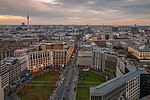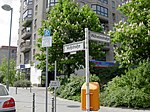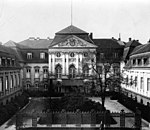The Congress of Berlin (13 June – 13 July 1878) was a diplomatic conference to reorganise the states in the Balkan Peninsula after the Russo-Turkish War of 1877–78, which had been won by Russia against the Ottoman Empire. Represented at the meeting were Europe's then six great powers: Russia, Great Britain, France, Austria-Hungary, Italy and Germany; the Ottomans; and four Balkan states: Greece, Serbia, Romania and Montenegro. The congress concluded with the signing of the Treaty of Berlin, replacing the preliminary Treaty of San Stefano that had been signed three months earlier.
The leader of the congress, German Chancellor Otto von Bismarck, sought to stabilise the Balkans, reduce the role of the defeated Ottoman Empire in the region, and balance the distinct interests of Britain, Russia and Austria-Hungary. He also wanted to avoid domination of the Balkans by Russia or the formation of a Greater Bulgaria, and to keep Constantinople in Ottoman hands. Finally Bismarck wanted to encourage the development of civil rights for Jews in the region. Under Bismarck's influence, the congress stripped the Ottomans of many of their European possessions, but refused to grant them to Russia and massively reduced the gains of Bulgaria (compared to the Principality of Bulgaria envisaged by the preliminary San Stefano treaty).
The affected territories were instead granted varying degrees of independence. Romania became fully independent, though was forced to give part of Bessarabia to Russia, and gained Northern Dobruja. Serbia and Montenegro were also granted full independence but lost territory, with Austria-Hungary occupying the Sandžak region along with Bosnia and Herzegovina. Britain took possession of Cyprus. Of the territory that remained within the Ottoman Empire, Bulgaria was made a semi-independent principality, Eastern Rumelia became a special administration, and the region of Macedonia was returned to the Ottomans on condition of reforms to its governance.
The results were initially hailed as a success for peace in the region, but most of the participants were not satisfied with the outcome. The Ottomans were humiliated and had their weakness confirmed as the "sick man of Europe". Russia resented the lack of rewards, despite having won the war that the conference was supposed to resolve, and humiliated by the other great powers in their rejection of the San Stefano settlement. Serbia, Bulgaria and Greece all received far less than they thought they deserved, especially Bulgaria which was left with less than half of the territory envisioned by the Treaty of San Stefano. Bismarck became hated by Russian nationalists and Pan-Slavists, and later found that he had tied Germany too closely to Austria-Hungary in the Balkans. Although Austria-Hungary gained substantial territory, this angered the South Slavs and led to decades of tensions in Bosnia and Herzegovina, culminating in the assassination of Archduke Franz Ferdinand.
In the long term, the settlement led to rising tensions between Russia and Austria-Hungary, and disputes over nationalism in the Balkans. Grievances with the results of the congress festered until they exploded in the First and Second Balkan Wars (1912 and 1913 respectively). Continuing nationalism in the Balkans was one of the causes of the First World War in 1914.










